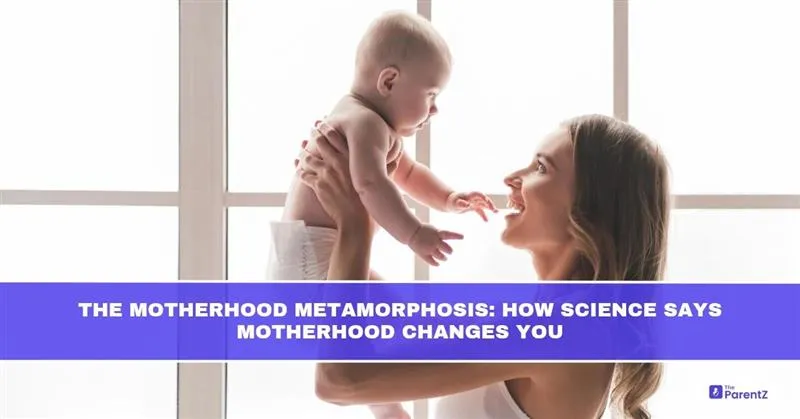The Biology of Becoming
The experience of motherhood is more than just an emotional shift; it is a comprehensive biological metamorphosis. Modern science recognizes that pregnancy and postpartum trigger complex, multi-system adaptations that remodel a woman’s brain, endocrine system, immune response, and even long-term health risks. This process is now being studied as a developmental stage in itself, often referred to as matrescence, similar to adolescence in its intensity and neuroendocrine restructuring.
1. Brain Changes: Neurological Remodeling in Motherhood
Structural brain imaging reveals significant, measurable changes in the maternal brain starting during pregnancy and continuing into the postpartum period. Longitudinal MRI studies show reduced grey matter volume in areas associated with social cognition, such as the medial prefrontal cortex, temporal lobe, and hippocampus. These reductions are not signs of degeneration but rather functional pruning, allowing for more efficient neural processing in caregiving contexts.
Importantly, these changes appear to be highly specific and persistent. Follow-up imaging two years postpartum indicates that many of these alterations remain, suggesting a long-lasting shift in the maternal brain’s architecture. These regions align with what is often called the “parental caregiving network,” which supports empathy, threat detection, and infant bonding.
Large population-based studies also show that mothers in midlife may exhibit higher grey matter density than non-mothers in certain brain regions, suggesting long-term neuroplastic benefits linked to caregiving roles.
2. “Mommy Brain” – Cognitive Fog or Functional Rewiring?
Cognitive changes in pregnancy and early motherhood are frequently referred to as “mommy brain", a phenomenon often described anecdotally as forgetfulness, verbal slip-ups, or mental fog. Meta-analyses confirm that mild cognitive declines occur in verbal memory, attention, and executive function, particularly in the third trimester and early postpartum period.
However, recent research reframes these deficits as adaptive trade-offs. Cognitive resources appear to be redirected toward vigilance, emotional regulation, and infant-related cue processing. Many women report improved sensory awareness, multitasking skills, and emotional attunement. Rather than signaling dysfunction, this may reflect the brain’s ability to prioritize survival-relevant tasks, such as reading infant expressions or responding to distress signals.
These changes often begin to normalize within 6 to 12 months postpartum. In some cases, they may even result in long-term benefits in memory and executive functioning due to the continuous mental challenge involved in caregiving.
3. Hormonal and Immunological Shifts
Motherhood brings about one of the most dramatic hormonal transitions in human biology. Throughout pregnancy, levels of estrogen, progesterone, human chorionic gonadotropin (hCG), and oxytocin surge to support fetal development and prepare the body for childbirth. After delivery, estrogen and progesterone levels drop rapidly, while oxytocin and prolactin become dominant.
Oxytocin, in particular, plays a central role in the development of maternal behaviors. It promotes uterine contraction during labor, stimulates milk let-down during breastfeeding, and enhances emotional bonding by acting on the amygdala and other limbic structures. Elevated oxytocin levels are linked with increased gaze, touch, and verbal interaction between mother and infant, forming the neurochemical basis of maternal bonding.
Another fascinating physiological phenomenon is fetal microchimerism, the persistence of fetal cells in maternal tissues for years or even decades after childbirth. These cells may play roles in tissue repair and immune modulation, although their full implications remain under investigation.
4. Postpartum Mental Health: Risk, Resilience, and Recognition
While the transition to motherhood is biologically adaptive, it also comes with significant mental health vulnerabilities. Postpartum mood disorders are among the most common complications of childbirth.
Postpartum Blues vs. Depression
Up to 80% of women experience “baby blues” in the first 10 days postpartum, characterized by irritability, tearfulness, and emotional lability. These symptoms typically resolve without intervention. However, postpartum depression (PPD) affects approximately 10–20% of mothers and requires clinical attention. Symptoms include persistent sadness, fatigue, sleep disturbances, and lack of interest or pleasure in previously enjoyed activities.
Postpartum Anxiety and PTSD
Anxiety during pregnancy and postpartum is increasingly recognized as a separate diagnostic category. Symptoms include excessive worry, intrusive thoughts, and somatic complaints. Childbirth-related post-traumatic stress disorder (PTSD) may occur in 2–6% of mothers, particularly following emergency interventions or perceived birth trauma.
Screening and Intervention
Current clinical guidelines recommend screening for depression and anxiety at least once during pregnancy and again postpartum, using validated tools such as the Edinburgh Postnatal Depression Scale (EPDS) or Patient Health Questionnaire (PHQ-9). Evidence supports early intervention with psychotherapy, mindfulness-based therapies, and pharmacological treatments when needed. For women with pre-existing psychiatric conditions, careful management of medications during pregnancy is critical, as abrupt discontinuation can increase relapse risk.
5. Physical and Immune Adaptations
Beyond hormonal and neurological changes, the maternal body undergoes profound physical shifts. The cardiovascular system adapts with increased blood volume, cardiac output, and vascular compliance. The musculoskeletal system experiences ligamentous laxity, pelvic widening, and postural shifts. Immunologically, pregnancy involves a finely tuned balance between tolerance (to prevent fetal rejection) and defense (to protect both mother and fetus).
These changes are not limited to the gestational period. Some persist into the postpartum months and, in certain cases, into long-term health trajectories. For instance, pregnancy is considered a cardiovascular stress test, uncovering risks for future hypertension, diabetes, and heart disease. Yet, parity is also associated with protective factors, such as reduced risk for certain cancers.
6. Clinical Implications: A Need for Integrated Care
Obstetricians, gynecologists, and primary care providers must view the perinatal period not just as a time of reproductive significance but as a neuropsychological turning point. Integrated care models that include mental health screening, social support, nutritional guidance, and postpartum follow-up improve maternal outcomes.
Health systems should normalize discussions around the emotional and cognitive shifts of motherhood, reducing stigma and validating the real neurobiological transitions taking place. Educating families, employers, and healthcare providers is essential to building a compassionate infrastructure for maternal well-being.
Conclusion
Motherhood is a metamorphosis that reshapes a woman from the inside out. Scientifically, it is one of the most extensive biological transformations in human life. From cortical remodeling and cognitive realignment to hormonal upheaval and emotional recalibration, these changes are far from anecdotal; they are measurable, enduring, and deeply embedded in physiology.
Yet for all its magnitude, this transformation is often misunderstood or minimized. Recognizing the full scope of the maternal journey, its strengths, its vulnerabilities, and its immense biological intelligence can shift both clinical practice and cultural understanding toward more humane,








Be the first one to comment on this story.